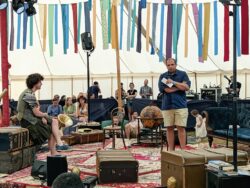Two Churchill Fellows, frustrated by the apathetic response to biodiversity loss developed a dramatic new way to highlight the demise of nature.
Driven by the observation that human activities are silencing nature, Dr Matthew Agarwala used sound to convey the enormity of biodiversity loss – and help draw attention to what must be done to help species recover.
His collaboration with composer Dr Ewan Campbell captured the attention of new audiences by linking a piece of classical music: Mendelssohn’s ‘Hebrides Overture’, with the loss of an iconic species: the North Atlantic Humpback Whale.
Crucially, the roughly 30,000 notes in the original music score approximate to the number of Humpback Whales there were in the sea in 1829, when the piece was written. But then extensive commercial whaling began to cause a dramatic decline in the whale population – and by 1920, two thirds of all Humpback Whales were gone.
Campbell divided Mendelssohn’s score into decades, then scrubbed out notes in proportion to the decline of the whale population as the music – and time – progresses. The resulting piece, ‘Hebrides Redacted’,has proved to be a dramatically simple way for audiences to grasp the enormity of biodiversity loss over time.
A short film about the music, and its impact on live audiences, was released online on Friday 14th October, 2022 as part of the Cambridge Zero Climate Change Festival. Watch it now:
The music was performed by the 38-piece Wilderness Orchestra at this year’s August Wilderness Festival in Oxfordshire, conducted by Campbell and narrated by Agarwala. The audience response was overwhelmingly positive – and the piece received a standing ovation.
“It really was an uninitiated audience at the Wilderness Festival – people were there for a good time, not to be told that the world is falling apart through the medium of music from the 19th century. But somehow it worked,” says Campbell, Director of Music at Churchill College and Murray Edwards College, Cambridge.
“Over the past century we have seen nearly a million species pushed to the brink of extinction – nature is going quiet,” said Agarwala, an Economist at the University of Cambridge’s Bennett Institute for Public Policy.
He added: “Researchers – including me – have been sounding the alarm about the consequences of biodiversity loss for a long time, but the message isn’t landing. Music is visceral and emotional, and grabs people’s attention in ways that scientific papers just can’t.”

Dr Ewan Campbell (left) and Dr Matthew Agarwala (right) performing ‘Hebrides Redacted’ at the Wilderness Music Festival. Image credit: John McMahon_The-RSA_@JohnMcArts
Image credit for headline image: Ewan Campbell
